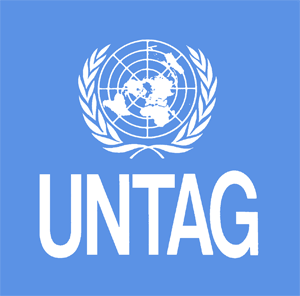Australian contribution to UNTAG
| Australian Services Contingent | |
|---|---|

Australia's contribution to the United Nations Transition Assistance Group
|
|
| Active | 1989–1990 |
| Disbanded | 1990 |
| Country | Namibia |
| Role | Engineering |
| Size | 300 |
| Part of | Military Component (MILCOM) |
| Decorations |
Australian Active Service Medal, United Nations Medal |
| Commanders | |
| Notable commanders |
1ASC: Colonel R.D. Warren, 2ASC: Colonel J.A. Crocker |
| Namibian Border Operational Area | |||||
|---|---|---|---|---|---|
| Part of the South African Border War and the Namibian War of Independence |
|||||
|
|||||
| Belligerents | |||||
|
|
|
||||
| Strength | |||||
| 5–8,000 PLAN |
|
||||
The Australian Services Contingent was the Australian Army contribution to the United Nations Transition Assistance Group (UNTAG) peacekeeping mission to Namibia in 1989 and 1990. Australia sent two contingents of over 300 engineers each to assist the Special Representative of the Secretary General, Martti Ahtisaari, in overseeing free and fair elections in Namibia for a Constituent Assembly in what was the largest deployment of Australian troops since the Vietnam War.
The Australian mission was widely reported as successful. Colonel John Crocker, commander of the second Australian contingent (2ASC), wrote that the November 1989 election was UNTAG's raison d'être and observed that "the Australian contingent's complete and wide-ranging support was critical to the success of that election and hence the mission – a fact that has been acknowledged at the highest level in UNTAG".Javier Pérez de Cuéllar, Secretary-General of the United Nations, wrote to Gareth Evans (Australia's Foreign Minister) about the "remarkable contribution made by the Australian military and electoral personnel", saying that their "dedication and professionalism had been widely and deservedly praised". Although a total of 19 UN personnel lost their lives in Namibia, the two Australian contingents achieved their mission without sustaining any fatalities – one of the few military units in UNTAG to do so.
Overall, the UNTAG mission assisted Namibia in transitioning to a democratic government after the racial segregation of the apartheid system. The military forces did not fire a shot during the operation, and Mays called it "possibly the most successful UN peacekeeping operation ever fielded"; Hearn called it "one of the major successes of the United Nations". Almost 20 years later, in a message to the annual session of the United Nations Special Committee on Decolonization on 28 February 2008, UN Secretary-General Ban Ki-moon noted that "facilitating this process" constituted "one of the proudest chapters of our Organization's history".
...
Wikipedia
